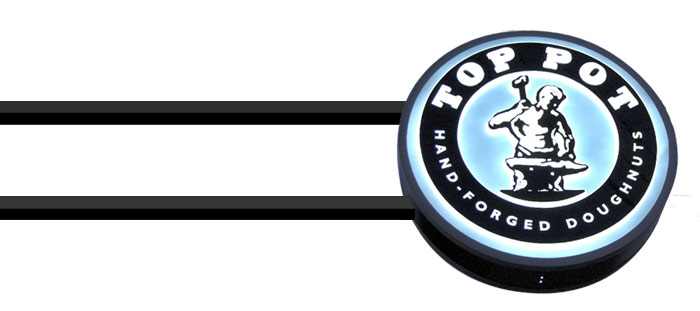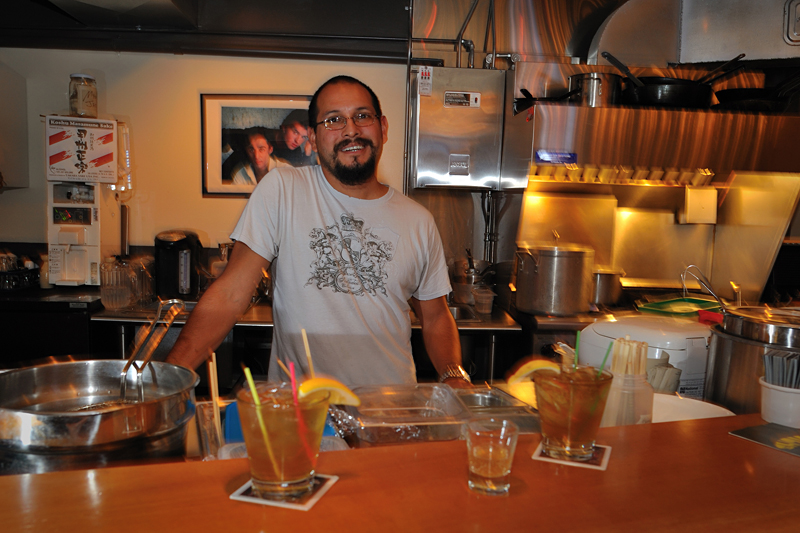After he retired from his job as an engineer with Seattle City Light, Robert Dickson made extra cash installing shelves or doing electrical work for friends. One of those friends was nightlife impresario Linda Derschang. He was doing some work for her at the Baltic Room in the late ’90s when she introduced him to Mark and Michael Klebeck. Derschang’s new club was on the site of the Klebecks’ previous venture, the short-lived Kid Mohair.
The Klebecks had moved on, and now had visions of doughnuts dancing in their heads. They were looking for investors. Michael, in particular, sold Dickson on the project. “[I] just fell in love with Michael’s dream,” Dickson recalls.
Dickson and his wife, Virginia, talked it over, decided they believed in the Klebeck brothers, and invested in Top Pot Doughnuts.
Now, nearly a decade later, the Dicksons say all their money is still tied up in the company; they haven’t received any return on their investment; the cash they put into doughnuts was used to fund other Klebeck projects; and no one at the company, where they have most of their assets, will even speak to them. Last month the Dicksons sued, making them the second Top Pot shareholder to do so since February.
A confidentiality agreement stemming from a previous dispute with the Klebecks bars the Dicksons from disclosing exactly how much money they put into Top Pot. But one of their attorneys, Derek Linke, says “It was significantly over $100,000.”
To invest in the business, the couple says, they took out a line of credit against the value of their Wedgwood home (a property currently valued by the assessor’s office at $500,000) and cashed in Robert’s retirement plan.
And at first, they loved it. Robert Dickson says that on a trip to Mexico to scout coffee sellers, they got to know the people in a village and started doing fundraisers for them. Dickson has an e-mail address that begins coffee_n_doughnuts. He and his wife considered the Klebecks their business partners and friends, he says.
But then things went sour, and now the Dicksons say they want out. They filed suit against Mark and Michael Klebeck, as well as the Klebecks’ business partner, Joel Radin, and two other company executives, on April 23. The suit claims the Klebecks and Radin illegally used money received from the Dicksons for Top Pot to fund other Klebeck businesses, including Bauhaus Coffee and the Elliott Bay Cafe. (Chef Tamara Murphy has since purchased and relaunched the latter.) The Dicksons claim that Top Pot, operating under the name Doughnut Corporation of America, which includes the five Top Pot locations, would lend money or supplies to the other operations, then forgive the debt—all at the expense of shareholders like them, who didn’t own any stake in Bauhaus or Elliott Bay. [Note: This story has been changed, it incorrectly included Zeitgeist Coffee among Top Pot’s holdings. The company split from Top Pot before the merger.]
Virginia Dickson sat on the board of Doughnut Corporation, along with the five insiders named in the suit, in 2006. She claims in her suit that the Klebecks and Radin would write themselves large checks without explanation. And no one seemed to have any specifics on the company’s overall health. When she asked them to bring in an outside auditor to clean up the books, she claims, they instead froze the Dicksons out completely, refusing to provide any information at all.
After reading about another early investor, Jan Johnson, who filed suit against the company (“Not Enough Dough,” SW, March 11, 2009), the Dicksons contacted Johnson’s attorneys, Linke and John Du Wors.
Johnson has claimed that the brothers and Radin manipulated her into approving a merger that took her 20 percent ownership stake in the original Top Pot on Capitol Hill to a fraction of all shares in the much larger Doughnut Corporation of America. This occurred just as the company signed a deal with Starbucks to deliver doughnuts to stores across the nation. The Klebecks argued that Johnson’s ownership stake was not large enough to require her approval of the merger.
Last month, one day after the Dicksons filed their own claims, a King County Superior Court judge dismissed five of 11 claims in Johnson’s case, including her allegations of fraud. Some of the dismissals were related to statute-of-limitations issues.
The Klebecks referred all questions to their attorneys. One of them, Josh Brower, said the ruling is “very significant,” but wouldn’t comment further on the Johnson or Dickson litigation, other than to repeat an earlier statement that “Top Pot’s always tried to retain positive relationships with its shareholders.” He said the company hopes to resolve the matter quickly.
Du Wors says the judge’s ruling doesn’t prevent Johnson from seeking damages on her complaint that the Klebecks and Radin did not act in her best interests as an investor. The judge also did not throw out a dispute over whether or not Johnson gave the Klebecks and Radin $50,000 after the merger. She claims she was neither paid back nor given additional ownership in Doughnut Corporation. In court records, the Klebecks and Radin deny ever receiving such money from Johnson.
For their part, the Dicksons say that at the least, they need to know what their stock is worth so they can sell it and get out. Robert Dickson says he offered to let the Klebecks buy them out, but they declined. “I feel rather betrayed,” he says.







